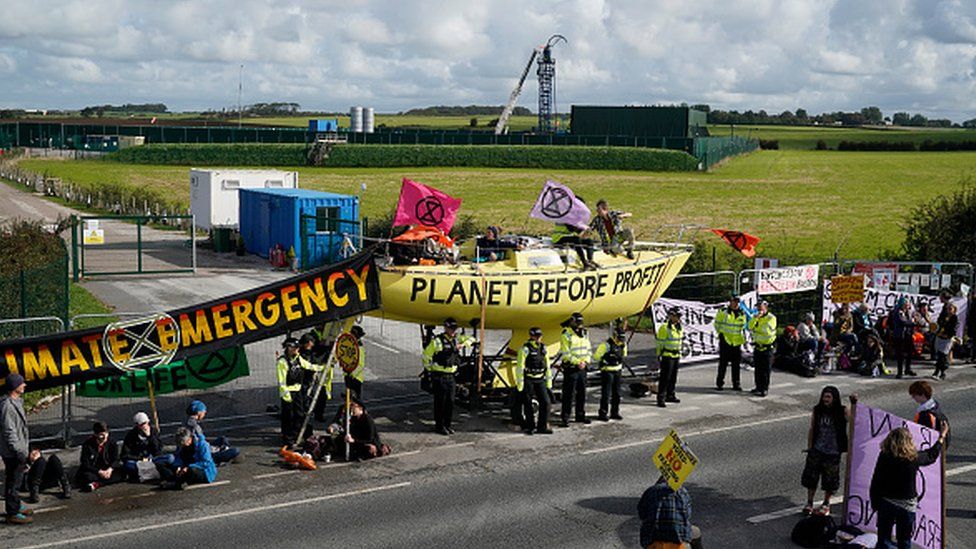Boris Johnson promises energy strategy as Russia gas concerns grow
- Published

Prime Minister Boris Johnson has promised to set out an "energy supply strategy" as his climate policies and UK gas production come under scrutiny during the Ukraine crisis.
He said he would outline how energy needs would be met as concern grows over western reliance on Russian oil and gas.
Mr Johnson said the UK was looking at using more domestic energy resources.
The UK's vow to reduce carbon emissions would not be abandoned, he said.
"But you've got to reflect on the reality that there is a crunch on at the moment," Mr Johnson said.
"We need to intensify our self-reliance as a transition with more hydrocarbons."
He added that the UK needed to invest in more nuclear and renewable sources to boost energy supplies.
The PM made comments at a Downing Street news conference on Monday after Tory MPs urged him to increase UK gas production and rethink his climate policies over energy cost and supply fears.
Nearly 40 MPs have called for an end to a UK ban on fracking, a controversial method of shale gas mining.
But government sources told the BBC there were no plans to resume fracking.
The government halted fracking in 2019 after scientists raised concerns about earthquakes and "unacceptable" risks to local communities.
The UK's only two shale gas wells, both in Lancashire, are due to be abandoned after the industry regulator ordered them to be sealed.
In a letter to Mr Johnson on Saturday, the MPs implored him to "pause and conduct a review of this decision" to reassess energy security at "a time of such geopolitical strife".
But the BBC understands the government's position has not changed and the fracking ban will remain until there is compelling scientific evidence that it can manage and predict earthquakes associated with the process.
Gas pressure
In a recent Twitter thread, Business Secretary Kwasi Kwarteng said fracking would not lower energy prices in the short term.
To improve energy security, Mr Kwarteng said the government would back gas production in the North Sea during the transition to renewables such as wind power.
Those reassurances have not assuaged the concerns of some Tory MPs. In recent months, as global gas prices reached record highs, they have been pressuring the government to relax its climate policies.
That pressure has only intensified since the Russian President Vladimir Putin's invasion of Ukraine, which has sent energy prices soaring globally and exposed EU reliance on Russia gas supplies.
Russia provides about 5% of the UK's gas supplies, in comparison to about 40% of the EU's.
Oil prices spiked on Monday as the UK, the US and their European allies considered banning Russian oil imports.
But former foreign minister and Tory MP Sir Alan Duncan told the BBC there was a risk of "banning our own supplies" by sanctioning Russian energy firms.
"Now, we of course, want to disadvantage Russia as an essential tool of war," he said. "But we don't want to disadvantage ourselves."
Net zero debate
Meanwhile some MPs from a Conservative group known as the Net Zero Scrutiny Group (NZSG) have been pushing for a rethink of the UK's net-zero policy.
It commits the UK to a legally binding target of net-zero carbon emissions by 2050.
Led by Tory MP Craig Mackinlay, the NZSG has warned of political consequences for Mr Johnson at the next election, should he stand by the policy.
The fracking letter to the prime minister was organised by Mr Mackinlay and former Brexit minister Steve Baker.
The letter came as Nigel Farage, the former Ukip and Brexit Party leader, announced the launch of a campaign to push for a Brexit-style referendum on the UK's net-zero target.
In an article for the Mail On Sunday newspaper, Mr Farage said the "political class in Westminster has made a decision on behalf of the rest of us without any public debate being held".
Questioning the costs of net zero, he said his political movement, Britain Means Business, would hold rallies under the slogan "Vote power, not poverty".
When asked about the campaign, a government source said the vast majority of MPs were elected on manifesto commitments to deliver net zero by 2050.
£1.4tnthe estimated cost to the whole economy
£344bnthe estimated net cost to the state with savings considered
0.4% of GDPthe estimated average cost to the state a year over three decades
The costsof net zero could be significant but not exceptional
Failureto control climate change would incur much larger costs
Benefitsof quick green transition could be significant
While no Tory MPs have publicly backed a referendum on net zero, some have expressed scepticism of the policy.
On Sunday, former Conservative Party leader Sir Iain Duncan Smith said policymakers needed to be "open and honest with the British public about how much all this will cost them and how much change to our everyday lives may be required".
Several studies, including one by the government's independent adviser, the Climate Change Committee (CCC), have outlined economic benefits of net zero.
But one report by a committee of MPs - released last week - said the government had "no reliable estimate of what the process of implementing the net-zero policy is actually likely to cost".
- Published3 March 2022
- Published2 November 2019
- Published10 December 2020